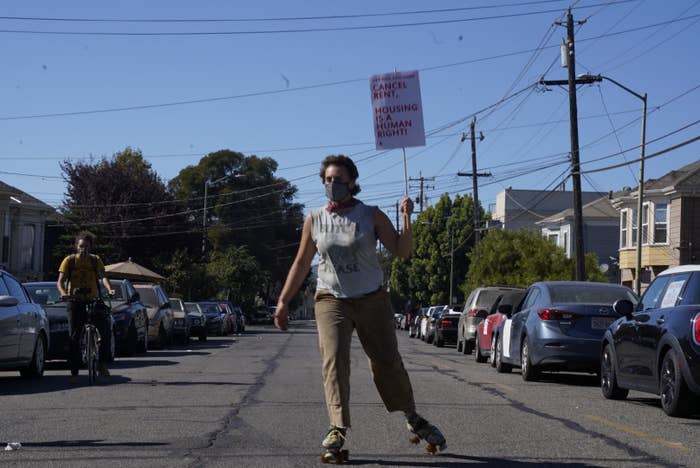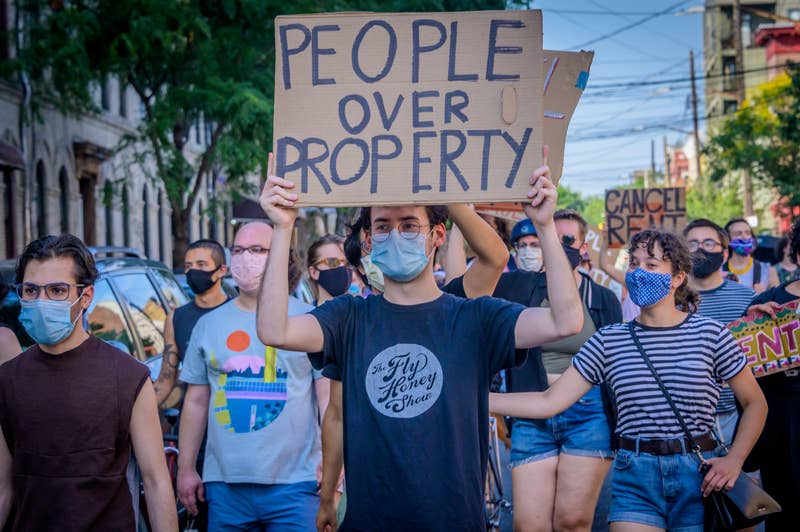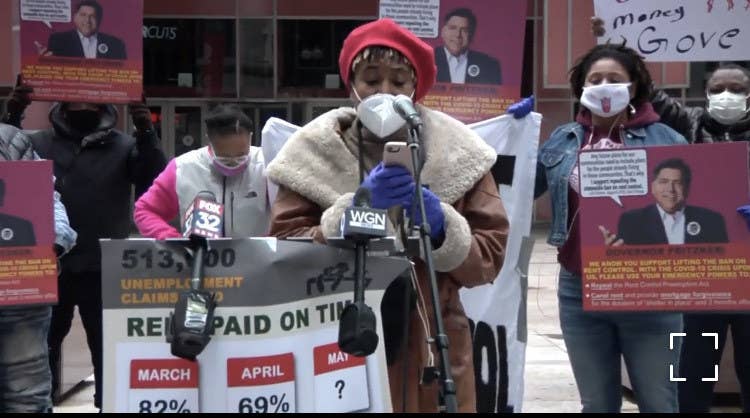“I don’t know how people do it alone without some sort of community backing.”
Lam Thuy VoBuzzFeed News Reporter
Posted on October 21, 2020
Posted on October 21, 2020

Rene Morrison courtesy of SMC Tenants Council
The documents arrived paper-clipped and folded in Tiana McGuire’s mailbox in early September. She owed three months’ worth in rent, $3,050, it said on the packet of pages that her landlord, Sullivan Management Company (SMC), had shoved into her and her neighbors’ mailboxes in their apartment building in Oakland.
“Pay rent in 15 days or quit,” the first page read.
This was the notice McGuire had dreaded ever since she stopped paying rent in June. Even though she knew evictions had been suspended in Oakland since late March, the letter made it clear: She had two weeks to pay the rent she owed or she had to vacate her home of the last seven years.
She felt her stomach drop to her knees when she read the notice.
“With the loss of work and facing uncertainty at every angle,” McGuire said, she was at the end of her resiliency. She didn’t know where she’d live if she were kicked out. The long-term Bay Area resident had seen her chosen home, Oakland, gentrify and become unaffordable for her, a 40-year-old service worker. If she had to leave this apartment, she’d have to leave the region altogether.
“It felt like shit when it happened,” said McGuire, whose income as a body piercer and cocktail server dried up when the COVID-19 pandemic brought much of the US economy to a grinding halt. “I’d been hedging my bets ‘til this happened.”
Across the country, millions of out-of-work renters like McGuire are unable to pay rent and are amassing an increasingly insurmountable debt. Roughly a third of all US households rent their homes, with rates being higher in urban areas. A recent study by national housing experts suggested 30–40 million renters are at risk of being evicted in August. And like McGuire, many don’t know where to turn for help.
For McGuire, relief came two days after the letter arrived. But not from the government officials. Not from authorities who could potentially stop illegal evictions. It came from her neighbors and fellow SMC tenants.

Courtesy of Tiana McGuire
McGuire in her garden
Over the last couple of months, tenants who found themselves in a similar situation as McGuire had begun to organize a council that spanned across several units. They set up an encrypted communications platform to safely talk about their collective demands. They had written three letters to the company, asking for rent forgiveness. They got no meaningful responses from the landlord, but then, six months into the pandemic, SMC suddenly asked for people to pay their debt or leave.
McGuire had been loosely aware of the tenants’ efforts to collectively address issues with their landlord, but this eviction notice gave her the necessary push to get involved. And so she contacted the SMC tenants council.
It turned out that, according to the council, at least 100 other people had received the same paperwork. While the council’s organizers did not have an immediate answer for McGuire as to whether this notice was legal or not, they immediately activated their network of lawyers, tenant advocates, and neighbors to find out whether McGuire and other SMC renters were at risk of being booted from their home.
McGuire attended an emergency Zoom meeting with the tenants council and other renters and came away from it with a sense of relief.
“The meeting did not necessarily answer questions,” said McGuire. But “I had space to take a breath because there were people in conversations with different lawyer groups, and they were all going to report back. […] I had enough space to let a week go by without it having it at the forefront of my mind.”

Erik Mcgregor / Getty Images
A housing protest in Brooklyn, New York, July 5, 2020.
With the pandemic ripping its way through the US, and the economy in freefall, many renters find themselves navigating legislative chaos that involves all levels of government, local, state, and federal.
On local and state levels, moratoriums varied wildly, according to the Eviction Lab at Princeton University. The state of Oregon, for example, will protect tenants from late fees for nonpayments while Minnesota will not. In Montana, landlords can start the process of eviction if tenants don’t pay rent, even if they can’t physically remove the tenants who are experiencing hardship due to COVID-19. The list of pressure points for landlords that the Eviction Lab tracks is long and includes things like cutting off utilities or reporting tenants to credit bureaus. And each state seems to protect tenants from some, but not all, of these methods to apply pressure.
On a federal level, the CARES Act protected renters from evictions temporarily, but the Trump administration took the biggest step to protect renters in early September, when it tasked the CDC to issue a national eviction moratorium — intending to keep renters like McGuire from being kicked out of their homes.
But it’s not as simple as that.
Renters have to jump through a number of hoops in order to stop from being evicted. For instance, to be protected under the moratorium, they have to sign a letter to their landlord, agreeing to a series of statements under perjury. One of these statements reads:
I understand that I must still pay rent or make a housing payment, and comply with other obligations that I may have under my tenancy, lease agreement, or similar contract. I further understand that fees, penalties, or interest for not paying rent or making a housing payment on time as required by my tenancy, lease agreement, or similar contract may still be charged or collected
Additionally, housing industry lobbyists and landlords have launched a barrage of lawsuits in local, state, and federal courts, challenging protections of renters from evictions and arguing that the federal government does not have the power to issue a blanket ban on evictions, according to the Washington Post. One of the cases was reportedly brought forward by an organization with financial ties to conservative billionaire and political donor Charles Koch. Facing increased pressure, the CDC amended its guidelines, allowing for landlords to begin eviction filings, even if they wouldn’t be executed until 2021.
Advocates across the nation are warning that the national moratorium is a temporary measure at best and that renters are facing an inevitable eviction tsunami once those protections are lifted. And a preliminary analysis from the Eviction Lab, which tracks evictions in 17 cities found that the new moratorium slowed down the number of new evictions filed to housing court, but didn’t entirely stop them. Since the pandemic, the Eviction Lab has collected data on more than 50,000 evictions in these 17 cities, which gives a sense of the scale of the problem faced all across the country.
All this legal chaos has forced a lot of people to take manners and form tenants councils like the one that is helping McGuire.
One month after McGuire received the notice to “pay or quit,” she found herself skating through the street in front of her landlord’s office during a car rally organized by the SMC tenants council, holding a sign that read in all caps: “CANCEL RENT. HOUSING IS A HUMAN RIGHT.”
“It felt invigorating, honestly,” said McGuire about going to the protest. “The instant camaraderie, seeing people’s faces real-time in the flesh that I had only seen on Zoom calls — it was so empowering. We’re all real, and we’re all really here together doing this.”
A few days after the rally, McGuire got a message from the council. Its efforts had paid off. SMC had not only addressed the tenants collectively through the council, it had also dismissed the notice it had sent out. In an email to residents, the company wrote:
“There has been some confusion between State and County laws. Please let this email serve as a formal remission of the 15 day notice previously served upon you.”
In a statement provided to BuzzFeed News, SMC acknowledged the actions of the council and said it was, “committed to ensuring a stable living environment for all our tenants clientele. We do rely on rent in order to cover all expenses as well as ensure a safe and habitable dwelling for all tenants. Recently, we served the California Statute 3088, 15 Day Notices seeking either payment of rent or confirmation of Covid-19 related hardship. In light of the response we received, a decision has been made to rescind the served notices.”
“We remain hopeful that Covid-19 pandemic will soon pass and our tenants can, once again, be more confident and their abilities to timely pay the rent. For those tenants who remain in a difficult financial situation, Sullivan Management remains confident that a meaningful compromise can be reached that meets all parties’ objectives,” the statement read.
McGuire is ecstatic about this outcome and said she was “going to throw those papers in the recycling and feel really good about not having those papers in the house.”
“It’s done for me, and it’s done for everyone else who received that letter and is on the council,” she said. “And it’s done for tenants who don’t even know that we have a council. And that feels awesome.”
Jordan Rome never thought she’d find herself going through a spreadsheet of tenants, calling each one of them to see if they’d sign a letter of demands to their landlord. She never considered herself an organizer.

Adam Blaszkiewicz courtesy of Jordan Rome
Jordan Rome
But in the spring of 2020, Rome was left with two choices: either get her Chicago neighbors on board to organize a campaign to reduce rent or end up on the street.
A filmmaker and restaurant worker, Rome had applied for unemployment in March but didn’t receive anything in June. “There was fire under my ass,” said Rome, who didn’t have anyone else to fall back on for financial help. “I didn’t come from a trust fund.”
As she was searching online for information about the pandemic, she stumbled on a document put together by the Autonomous Tenants Union (ATU), a volunteer-run organization in Chicago that educates tenants on forming unions to collectively make demands from their landlords. The document read like a blueprint for organizing, said Rome, who suddenly found herself thrust into a leadership position she never thought she’d take on.
She began to canvass her neighborhood with flyers that said “cancel rent” and slid outreach letters under her neighbors’ doors in her apartment building, which she said has around 100 units. When she started, she had two people who were on board to meet and talk. Soon they had meetings in the laundry room, each time recruiting more people who happened upon them while folding clothes or throwing a load into the wash. The Chicago Reader and other local media picked up on Rome’s activism, and her email account began to fill up with pleas from other renters for help.
With assistance from the ATU and another Chicago-based organization ONE Northside, Rome’s operation became more sophisticated. When she realized her landlord — a company called Hunter Properties — owned several buildings, housing advocates helped her cobble together spreadsheets of tenants by looking up registered voters at those addresses. She cold-called dozens of tenants, as did other volunteers who signed on to her efforts, and was able to bring together 30 people by the end of May. Hunter Properties did not respond to a request for comment from BuzzFeed News.

Courtesy of Jordan Rome
Jordan Rome speaking at a rally
“It became a refuge. You’re definitely not alone,” Rome told BuzzFeed News about the group that formed from these efforts. People were “not just talking,” she said — they found ways of “showing up” consistently.
“Initially, it was about saving myself, but then, as this grew, there was genuine community and purpose built through our organizing,” said Rome. “People were there for me through this entire process because everyone was going through something.”
Rome’s efforts are emblematic of a national movement that is brewing and that aims to assist renters who are facing a lack of protections.
Tenant unions are cropping up around the country and are increasingly forming statewide and national coalitions. They are collecting information about the latest policies in near real time and training one another about tenant rights on Zoom. Many have never been a part of this kind of grassroots organizing before.
The sophistication and rapid spread of Rome’s tenants movement is a testament to how the internet has accelerated this type of organizing. BuzzFeed News spoke to more than half a dozen tenant organizers in New York City, Oakland, Houston, Omaha, and Chicago who all organized in a similar manner: Many of them found resources written by long-term housing advocates or volunteer tenants organizers on public Facebook groups or anti-eviction websites.
You just have to google “how to organize tenants” and the internet will serve up a plethora of material. There are spreadsheets that track local moratoriums; documents that lay out clear marching orders for tenants to organize their neighbors; and flyer templates that people can modify to canvas their neighborhoods. Tenants use social media to exert pressure on landlords and have even begun to write up press releases for their latest rent-relief activities. And some Zoom meetings have seen as many as three to four dozen tenants convene in one sitting.
These documents can be used to mobilize dozens and hundreds of people on a hyperlocal level — whether it’s to coalesce entire neighborhoods or just one apartment building.
Tenant unions like Rome’s are stepping in where they feel the government is failing. All the organizers that spoke with BuzzFeed News have seen cases of harassment from landlords and an uptick in people seeking help to either organize rent strikes or seek help.
Even though numerous housing courts are not processing evictions, landlords are still finding ways to harass tenants for the money they owe. In Oakland, one landlord hired several men on motorbikes to remove the furniture of tenants who were behind on rent and locked the furniture up in a storage unit. Three immigrant families that occupied the home were without shelter for a night and only got their furniture back 10 days later after advocates intervened. Another landlord in the Bay Area removed a fence from a home in a neighborhood that had high rates of crime to intimidate nonpaying residents. In Sunset Park, a neighborhood in Brooklyn with a high immigrant population, advocates told BuzzFeed News that landlords have called ICE on tenants and shut off utilities like cooking gas.
In Fort Greene, Brooklyn, where a landlord changed a lock in a single-room occupancy building while the tenant was away, union organizers responded by summoning dozens of volunteers to protest in front of the home.
The protest was staged by the rapid response team of the Brooklyn Eviction Defense, made up of lawyers, organizers, and other volunteers who respond to landlord harassment and illegal eviction attempts.
Esteban Girón has been organizing tenants in Crown Heights, Brooklyn, since 2013, but has seen the number of people participating in their community meetings quadruple in recent months. His hyperlocal volunteer group, the Crown Heights Tenant Union, which covers one neighborhood, joined forces with the Brooklyn Eviction Defense during the pandemic.
As the armada of volunteers grows, tenants unions have increasingly begun to work with long-term housing advocates from NGOs and other organizations to attack the issue of housing insecurity from various angles. Girón and his peers are now working with NGO-based advocates to lobby for legal protections for tenants in the state of New York.
“We are able to do way more outreach than we have ever been able to do,” said Girón, who is hoping to push for a rent cancellation bill. “Coalitions are moving as a single unit right now.”
These legislative efforts are much needed, they say. While citywide and now federal eviction moratoriums have been introduced throughout the pandemic, most of them act as a way to delay an inevitable financial fallout. For many renters, this means that even after they move away, they are on the hook for the rental debt that they amass over time, said Leah Simon-Weisberg, legal director for anti-displacement and land use programs at the Alliance of Californians for Community Empowerment.
“We stopped the bleeding. [...] it kept people living there,” said Simon-Weisberg. But she worries that renters will face debilitating debt from months of not being able to pay rent. Most recently, her team of lawyers has started to explore bankruptcy as a way for people to get debt relief and are hoping to build toolkits for people to file for bankruptcy.
Advocates like Simon-Weisberg argue the only way to meaningfully address the looming housing crisis is to provide renters with assistance. This would help both renters who are worried about debt while also assisting landlords to keep their properties.
For some, even this kind of assistance would be too little too late. At the beginning of the summer, Rome decided to leave and temporarily move to Mexico. Before she left, she handed the reins of Hunter Properties Tenants Union to Hana Urban, a 27-year-old former barista, who had joined Rome early in her organizing efforts.
The union is still growing, even three months after Rome left, proving that the ad hoc organization now has a life of its own. The group has now grown to 50 active members under Urban’s leadership and they still convene on Zoom, closely monitoring developments in housing policies and writing letters to their landlord. With no clear end to the pandemic and its economic repercussions in sight, Urban finds solace in the fact that they have now found support and community through their work.
“I don’t know how people do it alone without some sort of community backing,” said Urban. “Knowing that there are a bunch of people with you in the same boat and want to do something about it [...] is much more empowering.”
Lam Thuy Vo is a reporter for BuzzFeed News and is based in New York.
No comments:
Post a Comment